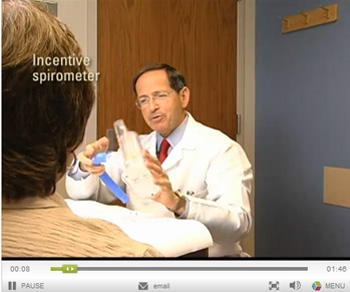Just as you can build up your arm and leg muscles with exercise, you can strengthen your lungs, chest and abdominal muscles with breathing exercises. Increasing the capacity of your lungs and "training" the muscles around them before surgery will lower your risk of developing pulmonary (breathing) problems, such as pneumonia and infection, after surgery.
Some of the best exercises for the lungs are long, even deep breaths. Deep breaths help keep your lungs clear of secretions that can lead to infections. Deep breathing also helps improve the function of your lungs so that they deliver as much oxygen to the rest of your body as possible, which speeds up the recovery process. [Coughing exercises have a similarly helpful effect.]
 To help with your breathing exercises, you'll receive an "incentive spirometer" prior to surgery. An incentive spirometer device measures – and shows you very clearly – how much air you're inhaling when you take a breath. The idea is to work to improve the amount of air you breathe into your lungs with each inhalation and how long you can hold it.
To help with your breathing exercises, you'll receive an "incentive spirometer" prior to surgery. An incentive spirometer device measures – and shows you very clearly – how much air you're inhaling when you take a breath. The idea is to work to improve the amount of air you breathe into your lungs with each inhalation and how long you can hold it.
If you have any of the following situations, your chances of having breathing difficulties or pneumonia after your surgery are significantly increased:
- Surgery of the chest or abdomen
- If you smoke or have a history of smoking
- If you already have lung (pulmonary) problems
- If you have, or will have after your surgery, long periods of time where you are unable to move or be active
LEARN
You probably received your incentive spirometer and instructions on how to use it during the MSHOP introductory class you attended. If you need a refresher, you can watch this video.
TRACK
So that you, and your doctors, can see your progress, it's important to keep track of how often you use your incentive spirometer and do your other breathing exercises. This easy-to-use log will help you.
Remember, we want to see you do your breathing and coughing exercises at least three times every day. Doing them more often is even better.

